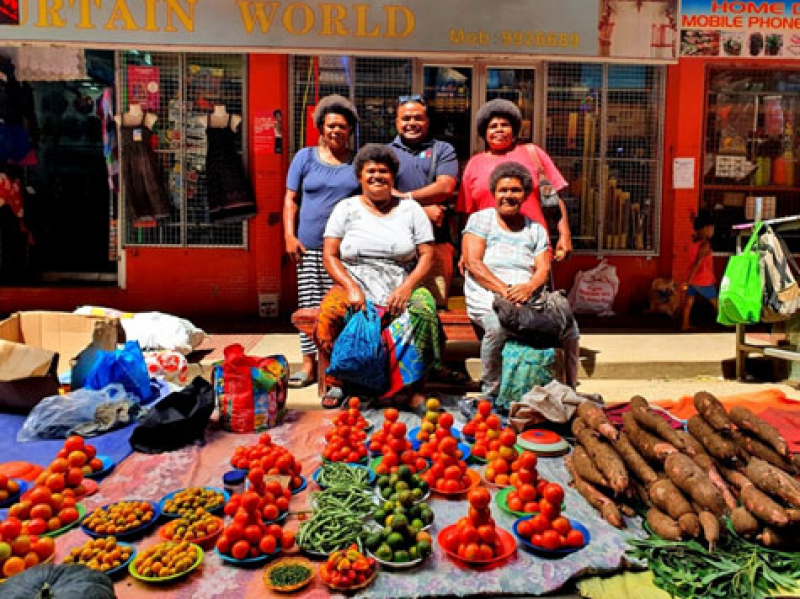- Arab-Islamic Summit Warns Israel Attacks Threaten Ties |
- South-South Cooperation: Building Innovation and Solidarity |
- Consensus must; polls to be a grand festival: Prof Yunus |
- Salahuddin sees security risks if polls miss February deadline |
- Qatar denounces Israel before major summit over Doha attack |
South-South Cooperation: Building Innovation and Solidarity

Stakeholders in an India-UN Development Partnership Fund project in Fiji, focusing on developing a climate disaster risk financing framework and parametric insurance.
As the United Nations commemorated the UN Day for South-South Cooperation last Friday, it was a reminder that solidarity among countries of the Global South is not only a matter of history or principle, but also a proven pathway to building a fairer and more sustainable future.
This year’s commemoration came at a defining moment.
We are past the midpoint of the 2030 Agenda, yet global progress is lagging. More than 800 million people still live in extreme poverty. Many developing countries continue to spend more on debt servicing than on essential public services such as health, education, and infrastructure.
At the same time, shared crises – climate change, food insecurity, digital divides, conflict, and systemic inequalities – are colliding and compounding what the Secretary-General has described as a polycrisis.
Yet South-South and triangular cooperation are emerging as beacons of resilience and collective action. They are not abstract concepts, but practical approaches driving innovation, scaling tested solutions, and ensuring ownership by the communities most affected by today’s challenges. They demonstrate that every nation – regardless of income level – has something to contribute to our common future.
Across the Global South, powerful examples of home-grown, adaptable solutions are evident. Through peer-to-peer learning and solidarity, countries are advancing digital transformation, expanding access to health coverage, creating resilient food systems, and mobilising innovative financing such as blended finance, debt swaps, and impact investments.
Triangular cooperation – where Southern-led initiatives are complemented by expertise from developed-country partners or multilateral actors – is amplifying these results, connecting experiences across regions and continents.
UNOSSC is sharing best practices, facilitating peer-to-peer learning, and scaling innovative approaches. Its South-South Galaxy platform makes tested solutions accessible to policymakers, practitioners, and development partners worldwide.
These range from climate adaptation strategies in Small Island Developing States to sustainable agriculture innovations in Africa and Latin America. The new South-South and Triangular Cooperation Solutions Lab is incubating promising ideas and linking them with partners and financing mechanisms to deliver impact at scale.
Still, much more must be done. At the 22nd Session of the High-level Committee on South-South Cooperation earlier this year, Member States stressed that the financing gap remains a critical obstacle. They called for sustained and predictable resources, as well as innovative UN financing windows aligned with the scale of ambition required.
Meeting this call to action is essential if South-South and triangular cooperation are to reach their full potential. As the primary intergovernmental body guiding South-South cooperation within the UN, the High-level Committee plays a vital role in shaping global policies, mobilising political will, and ensuring the voices of the Global South are heard at the highest levels.
The theme of the 2025 UN Day for South-South Cooperation – New Opportunities and Innovation through South-South and Triangular Cooperation – resonated strongly. It underscored the need to recommit and reimagine partnerships that leave no one behind, harnessing the creativity, leadership, and resilience of the Global South to transform today’s challenges into tomorrow’s opportunities.
As this day was marked, all partners and stakeholders – governments, international institutions, the UN family, civil society, and the private sector – were urged to strengthen South-South and triangular cooperation. Scaling up proven initiatives, deepening cross-regional ties, and investing in institutional frameworks that enable collaboration and innovation are critical.
The stakes could not be higher. With an economically empowered and innovative Global South, the path toward a more just, inclusive, and sustainable future can be paved.
As the United Nations Day for South-South Cooperation was commemorated last week, it was a moment to celebrate the spirit of solidarity that unites us – and to recommit to making it the driving force that carries us forward to 2030 and beyond.
Omar Hilale is Ambassador of Morocco and President of the 22nd Session of the High-level Committee on South-South Cooperation. Dima Al-Khatib is Director of the United Nations Office for South-South Cooperation.

